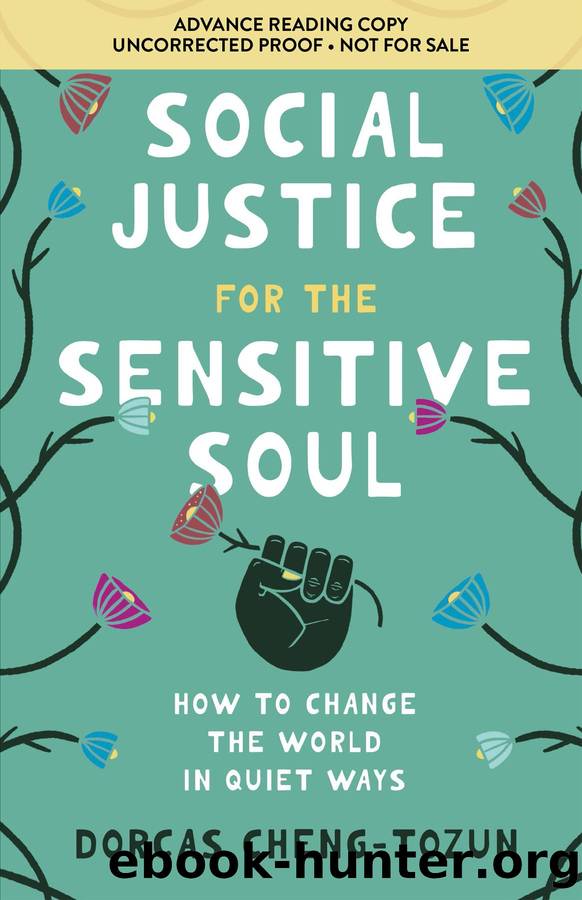Social Justice for the Sensitive Soul: How to Change the World in Quiet Ways by Dorcas Cheng-Tozun

Author:Dorcas Cheng-Tozun [Cheng-Tozun, Dorcas]
Language: eng
Format: azw3, pdf, mobi
Tags: Social Science, General, Psychology, Self-Help, Personal Growth, Personality, Activism & Social Justice
ISBN: 9781506483443
Publisher: Broadleaf Books
Published: 2023-06-20T13:22:27.530413+00:00
12
Connectors
âJustice is what love looks like in public.â
Cornel West
Harvard University public policy professor Robert D. Putnam published a book in 2000 that reverberated across American communities. Bowling Alone: The Collapse and Revival of American Community traced an alarming downward trend in social capital, a term used by social scientists to refer to the âvalue of social networks, bonding similar people and bridging between diverse people, with norms of reciprocity.â1 Social capital, according to political scientists, is âthe goodwill available to individuals or groups. Its source lies in the structure and content of the actorâs social relations. Its effects flow from the information, influence, and solidarity it makes available to the actor.â2 The more social capital, the more benefits individuals and communities experience, including greater bonds of trust, an increased willingness to help one another, and a greater sense of responsibility to others.
Putnam used research into shrinking participation in all kinds of groups, organizations, and institutions that foster engagement and communityâfrom the NAACP and unions, to church services and country clubs, to bowling leagues and marching bandsâto demonstrate that our social ties are weakening or severing altogether.3 We are becoming more distrustful and isolated. Our communities are becoming more dispersed, making it harder to develop a sense of solidarity or to organize collective actions.
More than two decades later, these trends have only continued. A study of ten thousand American adults found a 13 percent rise in loneliness between 2018 and 2019.4 In total, about 60 percent of respondents reported being lonelyâand this was before the COVID-19 pandemic. Loneliness was higher among Gen Z respondents, heavy social media users, and those without healthy work-life balance. Another 2018 study, this one by the Pew Research Center, found that 35 percent of American adults have a low level of trust in others; 41 percent had a medium level of trust, and only 22 percent were considered high trusters. The proportion of low trusters was highest among communities of color, Gen Z, and millennials.5
Without social connections, individuals suffer. But our societies suffer as well. If you donât feel connected to the people around you, you are far less likely to volunteer or vote. You tend not to follow news and current events. You donât try as hard to understand social issues.6 If you donât trust your neighbors, community leaders, or elected officials, youâre more prone to apathy and cynicism. What that means is you, and those around you, are short on social capital.
There are two major types of social capital: bonding social capital and bridging social capital. Bonding social capital exists between individuals who share similar backgrounds or values. You are bonded by all that you have in common, producing reliable and comfortable relationships that are likely to be sustained over time. Such relationships are essential and healthy, but they can also be insular and exclusive.7
Bridging social capital comes out of relationships that reach outside of typical demographics, characteristics, or social groups. Such relationships, which can be personal or professional, usually take more effort to build and maintain.
Download
Social Justice for the Sensitive Soul: How to Change the World in Quiet Ways by Dorcas Cheng-Tozun.pdf
Social Justice for the Sensitive Soul: How to Change the World in Quiet Ways by Dorcas Cheng-Tozun.mobi
This site does not store any files on its server. We only index and link to content provided by other sites. Please contact the content providers to delete copyright contents if any and email us, we'll remove relevant links or contents immediately.
Rewire Your Anxious Brain by Catherine M. Pittman(17607)
Talking to Strangers by Malcolm Gladwell(11925)
The Art of Thinking Clearly by Rolf Dobelli(8881)
Mindhunter: Inside the FBI's Elite Serial Crime Unit by John E. Douglas & Mark Olshaker(7860)
Becoming Supernatural by Dr. Joe Dispenza(7129)
Change Your Questions, Change Your Life by Marilee Adams(6674)
The Road Less Traveled by M. Scott Peck(6660)
Nudge - Improving Decisions about Health, Wealth, and Happiness by Thaler Sunstein(6651)
The Lost Art of Listening by Michael P. Nichols(6495)
Enlightenment Now: The Case for Reason, Science, Humanism, and Progress by Steven Pinker(6422)
Win Bigly by Scott Adams(6332)
Mastermind: How to Think Like Sherlock Holmes by Maria Konnikova(6263)
The Way of Zen by Alan W. Watts(5815)
Daring Greatly by Brene Brown(5669)
Grit by Angela Duckworth(4752)
Big Magic: Creative Living Beyond Fear by Elizabeth Gilbert(4743)
Men In Love by Nancy Friday(4353)
Flow by Mihaly Csikszentmihalyi(4071)
The Four Tendencies by Gretchen Rubin(4035)
